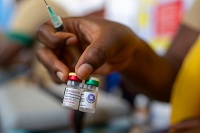 |
| Vials of Malaria vaccine. Credit: The Global Fund/Nana Kofi Acquah |
Malaria vaccines: Advances and future directions
KEY POINTS - Two vaccines are recommended for children in areas with moderate to high malaria transmission. - These vaccines reduce uncomplicated malaria by about 40%, severe malaria by 30%, and overall mortality by 13%. - Malaria vaccines should be used alongside other control measures like insecticide-treated nets (ITNs) and proper case management. Overview Malaria vaccine development began in the 1960s, with significant progress over the last decade. on October 6, 2021, the World Health Organization (WHO) recommended the RTS,S/AS01 (RTS,S) malaria vaccine for widespread use among children in sub-Saharan Africa and other high malaria transmission areas. In 2023, the WHO approved another vaccine, R21/Matrix-M, for malaria-endemic regions. Challenges in Developing a Malaria Vaccine Developing a malaria vaccine has been challenging due to the lack of a traditional market, few developers, and the technical difficulties of creating a vaccine against a parasite. The journey to develop a malaria vaccine has been lengthy - around 30 years - due to the complexity of targeting a parasite with a multistage life cycle. Malaria parasites have a complicated life cycle and immune response, with thousands of potential antigens. Unlike other diseases, exposure to malaria does not provide lifelong immunity, and acquired immunity only offers partial protection. 
The history of malaria vaccine development from 1960 to today's success. Credit: Almeida, Maria & Vasconcelos, Maria & Tarrag�, Andr�a & Mari�ba, Lu�s. (2021).
Circumsporozoite Surface Protein-based malaria vaccines: a review.
Revista do Instituto de Medicina Tropical de S�o Paulo. 63. 10.1590/s1678-9946202163011.RTS,S/AS01 Vaccine
Over a dozen vaccine candidates are in clinical development, with two approved for children under five in high transmission areas. GlaxoSmithKline Biologicals' RTS,S/AS01 was the first to receive WHO recommendation in 2021. This vaccine has been in development since the mid-1980s, thanks to a public-private partnership involving GSKBio, PATH Malaria Vaccine Initiative, African research organizations, and funding from the Bill and Melinda Gates Foundation. After successful Phase 3 trials in seven countries, a large-scale pilot implementation provided conclusive evidence of its feasibility, safety, and impact, leading to WHO's recommendation. 
A nurse gives the world's first malaria vaccine during a 2019 pilot program in Ghana.
The World Health Organization has since recommended this vaccine for use in
countries with moderate to high malaria transmission rates.
Cristina Aldehuela/AFP via Getty Images Key Findings from RTS,S/AS01 Pilot � Feasibility: The vaccine was effectively integrated into routine immunization systems, even during the COVID-19 pandemic. � Equity: RTS,S increased access to malaria prevention, particularly for children not using ITNs. � Safety: The vaccine has a favorable safety profile, with over 6 million doses administered by 2023 and no new safety issues. � High Impact: The vaccine reduced clinical malaria by 39%, severe malaria by 30%, and all-cause mortality by 13%. � Cost-effectiveness: The vaccine is cost-effective in moderate to high transmission areas. Following WHO's recommendation, global health organizations, including GAVI, committed funding to support the vaccine's broader rollout. Due to immediate high demand, WHO and GAVI developed an equitable allocation framework and researched ways to extend the limited supply through fractionated doses. 
Shipments of the world's first WHO-recommended malaria vaccine (RTS,S) to countries not part of the pilot vaccination programme,
have begun, with the first delivery made to Cameroon on the evening of November 21, 2023.
Credit: UNICEF/UNI474929/StoryMaxima R21/Matrix-M Vaccine WHO's recommendation of the R21/Matrix-M vaccine in 2023 is expected to increase vaccine availability for all children in malaria-endemic areas. Phase 2 and 3 trials showed it is safe, cost-effective, and highly efficacious, especially in highly seasonal malaria settings. Global Health Implications Malaria remains a significant burden, particularly in Africa, which accounted for 94% of cases and 95% of deaths in 2022. Despite efforts, malaria control progress has stalled, but the rollout of RTS,S/AS01 and the prequalification of R21/Matrix-M offer new hope. Implementation Challenges Limited production capacity and funding gaps pose challenges to widespread vaccine distribution. Countries need to prioritize who receives the vaccine and decide on booster doses. Combining vaccines with other interventions like ITNs and seasonal malaria chemoprevention can sustain protection. Community Engagement Effective malaria vaccine programs require community engagement, addressing vaccine hesitancy, and collaboration with cultural and religious leaders. Education campaigns and partnerships with communities are crucial for successful vaccine rollouts. Future Directions The Malaria Vaccine Technology Roadmap aims to develop highly effective vaccines by 2030, including those that reduce transmission and enable malaria elimination. Continued investment in vaccine development and support for global health organizations are essential for achieving these goals. 
|

